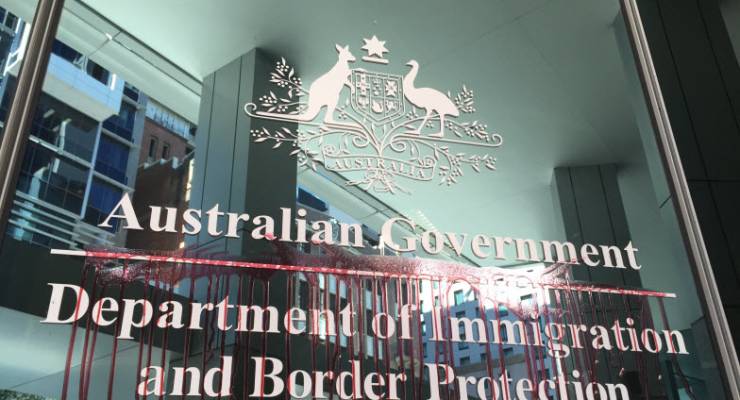
The Department of Immigration spent $1.1 billion with no authorisation on offshore detention on Manus Island and Nauru and spent an additional $1.1 billion without adequate records on who actually approved the expenditure, according to the Australian National Audit Office.
The second scathing report on offshore detention contracts dished out by the Department of Immigration and Border Protection in the past few months from the ANAO paints a bleak picture of departmental bungling over proper contract record management and performance management, after last year finding the department was unable to show value for money in the contracts.
[Aussies agree conditions on Nauru, Manus are terrible, wish they were worse]
The period of examination by the ANAO covers the reopening of offshore detention under the former Labor government up until last year.
The greatest indictment of the department was for its record management. In one extraordinary display of incompetence, the ANAO discovered that Immigration had failed to update an asset register and advise Comcover of new facilities in Nauru worth $75 million. This meant when a facility burned down during a riot in 2013 just after it had been commissioned, it was not insured.
Another major stuff-up was the department, through subcontractor Wilson Security, miraculously misplacing 75% of video it had originally said it possessed of incidents in offshore detention. Wilson kept video records of incidents in the detention centres from CCTV footage and footage recorded by staff. In late 2015, Immigration told the ANAO Wilson held 8 terabytes (8000 gigabytes) worth of digital records, but Wilson only handed over 2TB of video to the ANAO, saying that the remaining 6TB was “unrelated to incidents or investigations in the centre” or the property of Australian Border Force because ABF had installed CCTV cameras in May 2015.
Despite this, Wilson said it would now audit the data to confirm it was within the guidelines. In response to the report, however, Wilson Security also said the limitations of the environment on Manus and Nauru meant proper data security was difficult.
[Nauru, Manus contracts an off-the-charts bureaucratic bungle]
The ANAO found that in 2013, DIBP did not maintain its own database of incidents, making it difficult to identify trends or manage risk. By 2014, the department introduced a database using the same software Wilson was using for its own incident reporting system, but ANAO found no record of DIBP asking Wilson if it could just get direct access to Wilson’s system to avoid duplication.
This meant that there were significant variations in the records of incidents held between the department and service providers. DIBP only had 8009 records of incidents, while Transfield, which managed the camps, had more than 12,000. Wilson’s records were only 64 records out from Transfield’s figure. The ANAO report says the discrepancy means the department cannot be confident it is reporting accurately on incidents occurring in offshore detention:
“The environmental and infrastructure conditions that exist on Nauru and Manus Island mean that, at times, all organisations have struggled to maintain the information and communication technology access and service continuity that would be experienced in a modern, developed nation. Complicating factors range from the quality and consistency of electricity supply, to the quality and availability of data and internet services and connections on the islands.”
Wilson said the 8TB assessment was a “helpful comment” made by a member of staff who had just initially looked at the size of the video folder on the server.
Wilson said as a result of poor internet on Manus and Nauru there was local data storage in the detention centres. Data security was poor across the board, with the ANAO finding asylum seeker records on a public computer in detention centres, even though the data was supposed to be wiped from the computers daily.
The department told the ANAO it did not agree that the more than $1.1 billion in payments made were not authorised. Immigration says some of the payments were fixed, monthly contract fees dependent on the number of people held in offshore detention.








I dunno, it seems to me that the bureaucrats were extremely competent at their job of funneling money to the mates of their masters without too much of that annoying red tape.
” subcontractor Wilson Security, miraculously misplacing 75% of video ”
And thus we discover one of the benefits of out-sourcing. The accountability is out-sourced at the same time.
It is popular to out-source war these days.
Funny footnote to this is that yesterday our Curry or Maul was lashing out at union unaccountability, and a lack of records re expenditure, from the front page : today …..?
Is that a cricket chirping?
It’s almost like a Limited News distraction from this embarrassment for their Homer Dutton?
They were too busy withholding information – deleterious to the image of Limited News Pet, “potential Prime Minister” and Queensland’s Homer Dutton.
I am beyond rage, disgust with the duplicity, arrogance, illegality and inhumanity of both the Australian Government and their inhumane minions. The pervasive total distain for accountability and the criminal neglect exercised against those under duty of care of the Minister(s) responsible beggars belief.
Every single Minister of the Crown is culpable and every citizen complicit for what is taking place on Nauru and Manus Island in our name.
What a relief it is to know the unauthorised/unaccounted $2.2 Billion will be matched by Centrelink which is operating at the other end of the spectrum with excessive paperwork & holding hapless low income earners & unemployed to full account.
In fact, OVER-account in thousands of cases.
Despite clear evidence to the contrary, the woeful Coalition still insists (nay, actually believes) they are smart & responsible money managers. Imagine the sensational headlines & hullabaloo if a Labor government was in office while this was going on.
I didn’t think it was possible for this vicious department to ever get any worse, but they surprise me all the time.